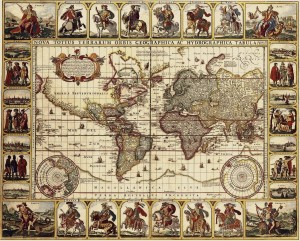The Geography of Shame: East vrs. West
When I teach on honor-shame dynamics in ministry and the Bible, people often comment, “You speak about shame in other cultures, but I think shame is a big issue here in America.” Westerners seem to feel decreasingly less guilt, and more shame (probably due to (1) post-modernism’s deconstruction of ‘rules’ and (2) the immigration of non-Western culture into America).
Shame is indigenous to humanity; we all experience it. Shame is not an Asian or Eastern issue; shame is an Adam & Eve issue. Guilt and innocence may remain primary values in Western institutions, relationships, and theology, but shame plays a definite secondary role in our lives, though it takes a different form than in Majority World cultures.
Western shame is private and personal; Eastern shame is public and corporate. (Remember, generalizations are always wrong, but usually helpful!!)

Western shame is centered upon the individual (as is Western culture as a whole); we evaluate ourselves as worthless or unlovable. As I evaluate my own life and identity, I doubt my own being and worth. Eastern shame is the result of others‘ negative evaluation. Western shame is about self-worth; Eastern shame is about public reputation. For this reason, American shame is researched by psychologists, whereas Eastern shame has been the domain of social anthropologists. The opposite of Eastern shame is honor – others thinking highly of me. The opposite of Western shame is self-esteem – I feel good about myself.
Western shame is not very contagious; others’ reputation is not strongly attached to mine, as in Eastern shame. The seedbed of Eastern shame is a strong communal culture, where the prying eyes of gossipy neighbors publicize my value.
But American shame stems from having minimal community (i.e. family or ethnic group) around us. We have an existential identity from not knowing who we are.
Western shame says, “I’m not known.” Eastern shame says, “I’m too known.”
One unique result of social media is that people (not just companies or products) are now brands. People turn to social media to create face, project a likable image, and make ‘friends.’ These are hallow exercises in shame-reduction. Social media, I suspect, helps mask shame. Though great for communication, social media does not remedy shame.
Bullying (the contemporary technique for shaming) increasingly occurs on social media, as people are ridiculed in comments and hashtags. As we chisel our public brand with tweets, the persistent awareness that our public brand is not the real ‘me’ can breed further shame.
We all need salvation from shame…whoever we are, wherever we live.
Where do you see shame in Western culture?
Shame is indigenous to humanity; we all experience it. Shame is not an Asian or Eastern issue; shame is an Adam & Eve issue. Guilt and innocence may remain primary values in Western institutions, relationships, and theology, but shame plays a definite secondary role in our lives, though it takes a different form than in Majority World cultures.
Western shame is private and personal; Eastern shame is public and corporate. (Remember, generalizations are always wrong, but usually helpful!!)

Western shame is centered upon the individual (as is Western culture as a whole); we evaluate ourselves as worthless or unlovable. As I evaluate my own life and identity, I doubt my own being and worth. Eastern shame is the result of others‘ negative evaluation. Western shame is about self-worth; Eastern shame is about public reputation. For this reason, American shame is researched by psychologists, whereas Eastern shame has been the domain of social anthropologists. The opposite of Eastern shame is honor – others thinking highly of me. The opposite of Western shame is self-esteem – I feel good about myself.
Western shame is not very contagious; others’ reputation is not strongly attached to mine, as in Eastern shame. The seedbed of Eastern shame is a strong communal culture, where the prying eyes of gossipy neighbors publicize my value.
But American shame stems from having minimal community (i.e. family or ethnic group) around us. We have an existential identity from not knowing who we are.
Western shame says, “I’m not known.” Eastern shame says, “I’m too known.”
One unique result of social media is that people (not just companies or products) are now brands. People turn to social media to create face, project a likable image, and make ‘friends.’ These are hallow exercises in shame-reduction. Social media, I suspect, helps mask shame. Though great for communication, social media does not remedy shame.
Bullying (the contemporary technique for shaming) increasingly occurs on social media, as people are ridiculed in comments and hashtags. As we chisel our public brand with tweets, the persistent awareness that our public brand is not the real ‘me’ can breed further shame.
We all need salvation from shame…whoever we are, wherever we live.
Where do you see shame in Western culture?

We all come from the same Father, and Jesus wants us to be One. We know this from John 17. With that said, I believe that shame comes from a separateness that we have created here on this earth among ourselves. Something we do or others do separates us from each other – and therein lies the shame – “you’re not like I am,” “we don’t do it that way.” When we come together as brothers and sisters, in love, and then in no judgment, there will be no shame. That promise should be a huge pull to those who don’t know Jesus. The bottom line is that all shame is a separateness that we have created.